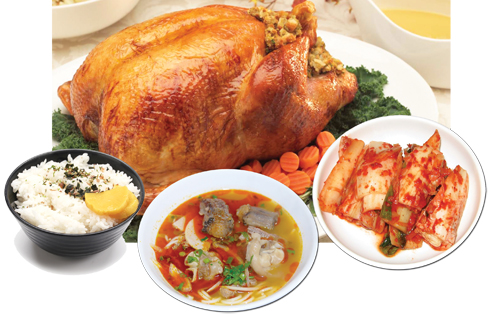
By Steven Cong
Northwest Asian Weekly
“As you know, we, the Korean people, have to have Thanksgiving with rice and kimchi,” said Paul Chunki Kim, a Korean American realtor in Puyallup.
This November, many Asian American families will reflect on Thanksgiving and how to apply it to them, their community, and their society.
The food
“Some [Asians] like the turkey with rice instead of mashed potatoes,” said Gemma Dulay, a Filipino senior accountant at Pacific Lutheran University in Tacoma.
“We will have racks of lambs, mashed potatoes and gravy, pie, bún bò huế (noodle soup) and mì quảng (noodles with a little broth),” said Phung Vu, describing the mix of American and Vietnamese food at her family’s Thanksgiving table. Like Vu, Minh Nguyen’s family also incorporates Vietnamese dishes into a traditional Thanksgiving meal. “Besides some traditional American dishes, we also have spring rolls and tempura shrimps, and for desserts, we like banana chè (a coconut-based pudding),” said Nguyen.
For Dulay’s family, Thanksgiving staples also include lumpias and stir-fry noodles. In past years, Dulay’s Thanksgiving tradition began when her son went out to play “Turkey Football” with friends. The kids would cut out pictures of potential Christmas presents from the Internet, and give it to the adults. The family would later gather at dinner, where each person would stand up and announce what it is that they are thankful for.
Where Dulay has incorporated Filipino food into American Thanksgiving, Kim celebrates a unique Thanksgiving tradition that began centuries ago in Korea. It is called Chuseok, or autumn evening.
Everyone gathers at his mother’s house, and all the women would dress in traditional han bok, a Korean garment. The activities include gune jumping, a Chuseok tradition honoring ancestors. Many Korean Americans celebrate Chuseok in November, as opposed to traditionally celebrating it in August. Someone in Kim’s family still prepares a turkey.
The (new) traditions
“We’re going to eat as much as we can, and we just tell stories, and laugh, and talk,” said Dulay, describing her favorite pastimes during the holiday.
“We talk about a lot of memories back home in Korea,” said Kim, who stated that Thanksgiving for him is a chance to reminisce.
For many Asian families, Thanksgiving holds a special purpose, and that is to give thanks for their good fortunes in the United States. In their opinion, it is of great value for the Asian American community, and for its assimilation into the American culture.
“It becomes clear for us immigrants … how great this country is,” said Dulay, who learned to celebrate Thanksgiving with friends who came to the United States as adults. She says that it’s a time of reflection and realizing how blessed she is to have come to the United States. “Things come so easily here, and in the process, we take them for granted. I came from one of the best schools in the Philippines, and when I came here, I realized I could have been more.”
“We’re lucky to live in this land of opportunity,” said Kim, “with the freedom that other countries like North Korea might not have. In some third world countries, people are dying. It reminds me not to waste what I have, because it is a sin to those who don’t have what I’ve got.”
Both Dulay and Kim refer to Thanksgiving as a time of unity and understanding American values. They find in this holiday an opportunity to be role models for their children.
Dulay describes the immigrant experience as “a plant that’s uprooted, and needs to grow in a different soil. It’s up to me to [make it] thrive.” The idea of taking a day off to give thanks captivated her when she had first arrived in this country.
“It is helpful to participate in — and to come together with — Americans for a common purpose,” said Kim, stating what he believes to be universal goals of this holiday. “It is important for educational purposes because it lets us show our children how to treat people.”
“I need to remind my kids why we’re having Thanksgiving,” said Dulay, who shares Kim’s sentiment. “I have to drill in how blessed and how thankful we should be,” she adds, noting the particular significance of this year. “Last year, it didn’t really hit us, but now we see [the effects of the recession]. We have to know how fortunate we are that we have jobs and that we’re enjoying a feast like this.”
Both Dulay and Kim claim to be relatively Americanized, and said that they have been celebrating Thanksgiving the same way for years. They feel that this holiday carries a strong sense of purpose.
“In a way, its importance is twofold,” Dulay elaborated. “It’s to get with family and to embrace the American culture together.” ♦
Han Bui contributed to this report.
Steven Cong can be reached at info@nwasianweekly.com.



